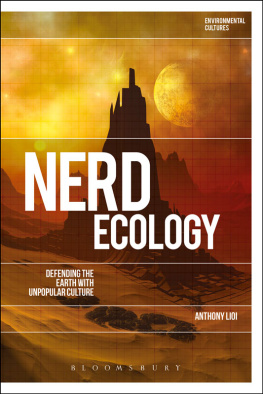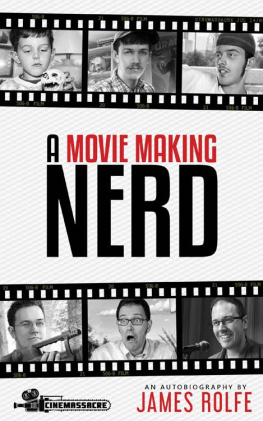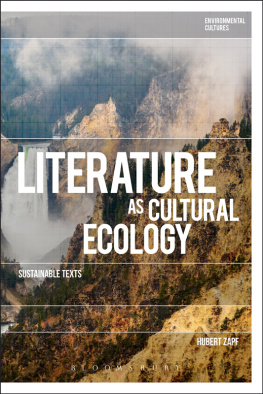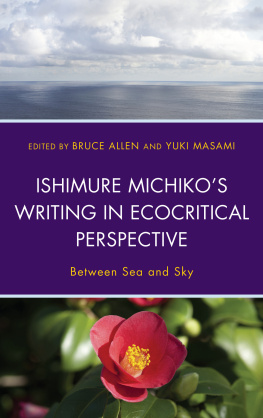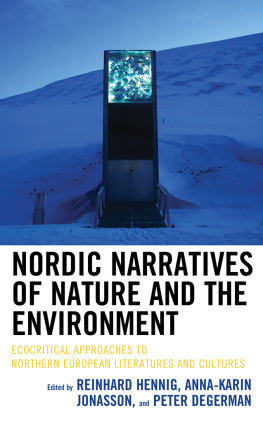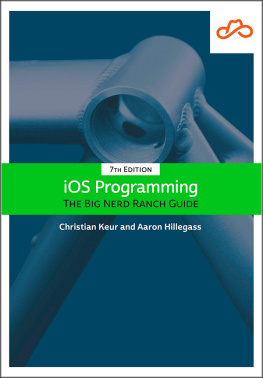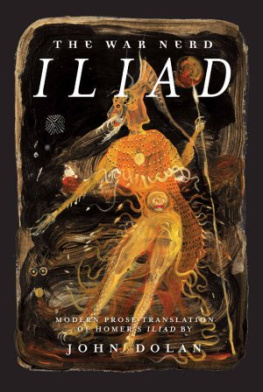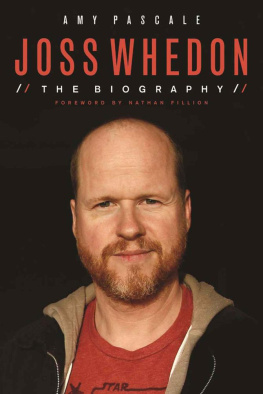Nerd Ecology
Environmental Cultures Series
Series editors:
Greg Garrard, University of British Columbia, Canada
Richard Kerridge, Bath Spa University, UK
Editorial Board:
Franca Bellarsi, Universit Libre de Bruxelles, Belgium
Mandy Bloomfield, Plymouth University, UK
Lily Chen, Shanghai Normal University, China
Christa Grewe-Volpp, University of Mannheim, Germany
Stephanie LeMenager, University of Oregon, USA
Timothy Morton, Rice University, USA
Pablo Mukherjee, University of Warwick, UK
Bloomsburys Environmental Cultures series makes available to students and scholars at all levels the latest cutting-edge research on the diverse ways in which culture has responded to the age of environmental crisis. Publishing ambitious and innovative literary ecocriticism that crosses disciplines, national boundaries, and media, books in the series explore and test the challenges of ecocriticism to conventional forms of cultural study.
Titles available
Cities and Wetlands, Rod Giblett
Ecocriticism and Italy, Serenella Iovino
Literature as Cultural Ecology, Hubert Zapf
Forthcoming titles
Bodies of Water, Astrida Neimanis
Climate Crisis and the 21st-Century British Novel, Astrid Bracke
The New Nature Writing, Jos Smith
The New Poetics of Climate Change, Matthew Griffiths
Nerd Ecology
Defending the Earth with Unpopular Culture
Anthony Lioi
Bloomsbury Academic
An imprint of Bloomsbury Publishing Plc

Contents
This book began in 1983 at Bishop Eustace Preparatory School when Joan Cecil asked us to deliver a how-to oral presentation, and I chose How to Be a Stereotypical Nerd as a subject. Thanks to her and to all my teachers, especially Suzanne Hoos, who kept science fiction alive at St. Thomas the Apostle School; Joseph Marquart, Mary Jane Silvia, and Lou Phillips, also of BEP, for teaching me the apocalypse of stories; Elizabeth Kirk and Meera Viswanathan of Brown University, for teaching medieval and contemporary literature as episodes in an epic tale; Alicia Ostriker of Rutgers University, for demonstrating that resistance is not futile; and Marc Manganaro, also of Rutgers, who encouraged my anthropological and folkloristic tendencies (though he never overcame my cheery pluralism, as this book demonstrates). I am proud to stand in your lineage.
As for the book itself:
Thanks to Nicole Merola and Jill Gatlin for taking nerd ecology seriously when I did not. Thanks to Greg Garrard for asking me what I was working on, and for his intellectual, professional, and editorial encouragement. Thanks to him and Richard Kerridge for inviting me into the Environmental Cultures series. Thanks to Mark Richardson and David Avital of Bloomsbury Academic for their patience and enthusiasm throughout the writing process. Special thanks to Counselor Chelsea Feltman for her crucial intervention that uncovered a secret element in the Nerd Triangle just in time to save the Enterprise-J. I am grateful for the mutant solidarity of Ramzi Fawaz, who gave me access to secret documents that greatly improved .
This book would not have been possible without the support of the chairs of Liberal Arts at the Juilliard School, Mitchell Aboulafia and Jo Sarzotti, whose strategic enthusiasm was crucial to the planning, research, and execution of this project. Jane Gottlieb and Alan Klein of the Lila Acheson Wallace Library at Juilliard expedited all my immoderate demands on the Interlibrary Loan system, and I thank them for making my research materials appear out of , The Great Music, was made possible by the John Erskine Faculty Prize, and I thank the Juilliard administration for this award, which propelled the book forward. Thanks to my deans, Karen Wagner and Jos Garcia-Len, for listening to my crazy plans. Special thanks to all of my colleagues in Liberal Arts for their friendship and dedication to teaching.
Thanks to the hordes of the Juilliard Writing Center, especially Amber Schaub, Rachel Bardin, Laura Jo Hess, Cynthia Eytina, Deanna Troi, Bert Wilson, Aaron Jaffe, Rene Baron, Ben Laude, Peter Dugan, David Clausen, Barret Anspach, Bryan Conger, Hannah McDermott, Patrick McGuire, Gabrielle Marx, Simon Frisch, Cathy Kemp, Vernica Ordaz, Adarsh Kumar, Rachel Straus, Rene Houtrides, Molly Skardon, and Jon Yaeger. May Totoro always keep you fully caffeinated.
This project was conceived at the Massachusetts Institute of Technology, and I thank Mya Poe, Henry Jenkins, Sam Ford, Kim De Vries, Shariann Lewitt, Helen Lee, Wyn Kelley, and Les Perelman for their friendship and support as I worked through my opening moves on unpopular culture. It was Henrys observation that Galaxy Quest is the second-best Star Trek film that set my thinking about Wrath of Khan in motion.
As I argue below, nerdists cannot emerge without an alliance, and so I offer my Scooby Gangs great affection and gratitude: Kristen Abbey and Rick Anderson, for decades of nerdist argument; Todd Cohen and the Cohen family for guiding me through the Atari Age; Joe Walsh and Jack Paxton, for entrance into those primal other worlds, the Farm and the Cave of Pestilence; Chris Pizzino, for being the other half of my pop-culture brain; Kauser Ahmed, Daniel Maffei, and John Fitzgerald for that primal refuge at 19 Pitman Street, and all the Fitzgerald-Murrays for being the Weasleys to my Potter; Andrew Sornborger and Dave Howard, for bridges to other worlds; Sandy Sullivan-Dunbar and Mary Ellen ODriscoll, for critical feminist nerdology; Marcus Renner, for groovy intersectionality; Joe Lin, Scott Ross, and Robin Renee for burning the nerd fire through the dark years of the 1980s; and Mark Marotta, for years of Dungeons & Dragons. Thanks to all the members of the Rutgers NerdMind, especially Katherine Lynes, Sonia Di Loreto, Sarah Avery, Dan Davis, Erica Romaine, Chiara Cillerai, Allison Pruitt, Mary Jo Watts, Laura Day, Channette Romero, Ann Dean, Bo Chen, Eric Aronoff, Alex Bain, Aryana Bates, Anjanette Young, Susan Arvay, Sam McDonald, Alix Garzero, Diane DeLauro, Gary Bartlett, Jaime Wells, Silvia Muller, Bill Crosbie, Julia Mendenhall, Carol Bork, Barclay Barrios, Anne Paulet, Don Zirilli, Sarah Gormley, Jim Genzano, and Richard Miller. Special thanks to Sara Warner for her skepticism, which made me think harder about premises and goals. Thanks to the nerds of Providence, especially the Poe-Cogan Continuum, Ken DeBlois, Laurie Naranch, Theo Scott (honorary), Mary Bellhouse, Susan McCarthy, Julia Flanders, Elli Mylonas, Vika Zafrin, and Ethan Fremen.
Thanks to my friends and colleagues in the Association for the Study of Literature and Environment (ASLE United States) and all of its sister organizations across the world for making a planetary ecocriticism possible. Thanks especially to Amy McIntyre, Joni Adamson, Cate Sandilands, Paul Outka, Karla Armbruster, Salma Monani, Tom Lynch, Cheryl Lousley, Mark Long, Kimberly Ruffin, Steven Rust, Drew Husband, Chia-ju Chang, Sid Dobrin, Greta Gaard, Simon Estok, Stephanie Foote, Stephanie LeMenager, Janet Fiskio, Annie Ingram, Dan Philippon, Adam Sweeting, Christoph Irmscher, Megan Condis, Siobhan Senier, Lauren Woolbright, Serenella Iovino, Serpil Oppermann, Stephanie Posthumus, Una Chaudhuri, Heidi Hutner, Stacy Alaimo, Ursula Heise, Patrick Murphy, Heather Sullivan, Scott Slovic, and Tonia Payne for all kinds of help, encouragement, and inspiration. We are Groot.
Thanks to the Order of the Van for showing me the Sonoran Desert during the 2009 NEH Summer Institute, Nature and History at the Nations Edge. No broken sky.
Next page
